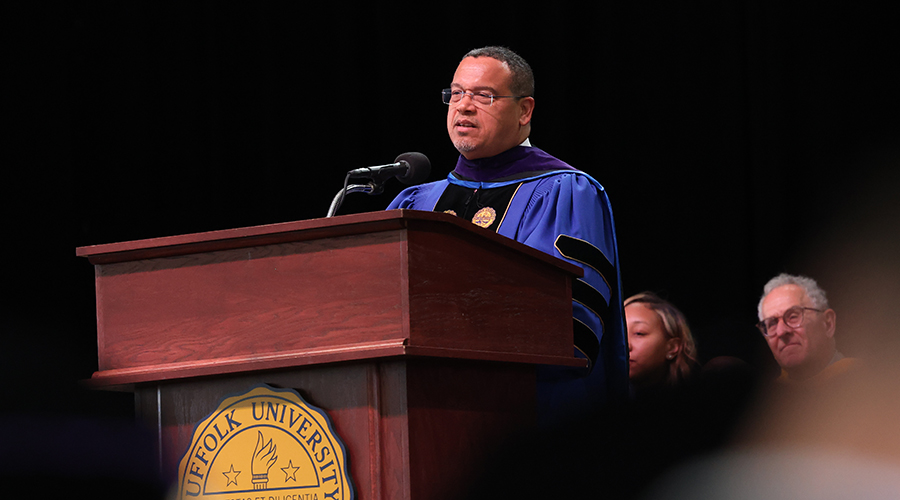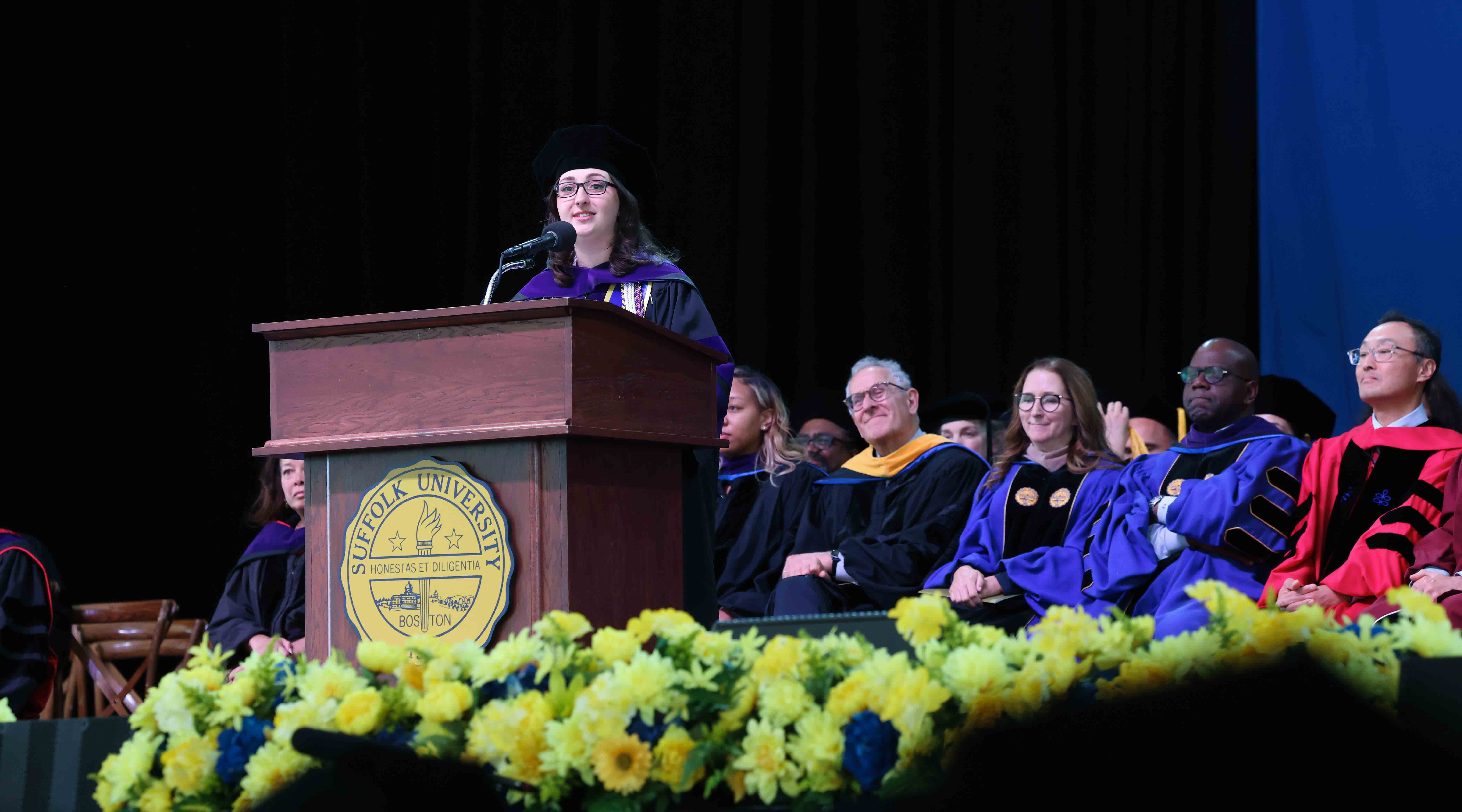‘Being a good lawyer means standing up for democracy.’

In his Commencement address to the Suffolk University Law School, Minnesota Attorney General Keith Ellison told the graduates that being a good lawyer in 2025 means standing up for the rule of law, even when it’s hard.
Quoting philosopher John Locke’s famous observation—“Wherever law ends, tyranny begins”—Ellison argued that while our laws may be imperfect, “once the law ends, there is a new law that takes over—and that law is the law of the jungle... This is not anything remotely close to a democracy, nor is it a system of justice. It is simply might makes right.”
Ellison—who led the successful prosecution of the Minneapolis police officer who murdered George Floyd—was awarded an honorary Doctor of Laws degree at the Suffolk University Law School ceremony, one of three Suffolk commencements held at Boston’s Leader Bank Pavilion on Sunday, May 18.
“Being a good lawyer means standing up against tyranny. Being a good lawyer means standing up for democracy, and it means standing up to bullies who try to divide and exclude people,” he said.
‘There’s nothing partisan about the rule of law’
Ellison devoted much of his remarks to the role of lawyers in a time when, he said, both legal precedents and the rule of law are under attack. The president "is in the middle of bullying law firms into turning over their pro bono hours to him and revoking their security clearances because they took on clients that he perceives as enemies to himself,” he said. “I want to be clear, I’m not making a partisan statement. There’s nothing partisan about the rule of law."
“The brave will stand up for it. And yet there are others who won’t. I want you to be among those who do.”
The questions aren’t new
While the times may feel unprecedented, the questions they raise about standing up to power aren’t new, Ellison argued. “I guarantee you that people like [Justice] Thurgood Marshall and Charles Hamilton Houston faced these same questions, and I think you know how they answered,” he said, pointing to the legal legends instrumental in building the winning strategy in Brown v. Board of Education.
He drew a direct line from these civil rights icons to today’s graduates, challenging the Class of 2025 to measure themselves not solely by traditional metrics—grades, clerkships, and the partnership track—but by questions of moral courage: “Did I stand up for the rule of law, for the Constitution, for the principles of this country?” he asked.
He told the graduates that “when DEI becomes a slur and a stand-in for words that are too ugly to say in polite company, we’ve got to fight for real DEI. There’s a lot of ways to be excluded,” he said, such as being from a remote area, being a veteran, having a disability, being a single parent. “What we’re really saying when we say DEI is: ‘We’re trying to create a system of belonging so that there is no out-crowd.’”
“When a society starts going in a dictatorial direction, lawyers have a special role to play,” Ellison concluded. “I just want you to ask yourself whether you’re willing to play it.”
Class of 2025 Navigates ‘Unfathomable Change’ While Delivering Millions in Legal Aid
As artificial intelligence reshapes the legal profession, Suffolk University President Marisa Kelly told the audience that members of the Class of 2025 aren’t slowly adapting to the revolutionary technology. Instead, she said, graduates have been leading the charge for access to justice in Massachusetts both by harnessing AI in innovative ways, and through a powerful commitment to providing legal aid.
Collectively, Suffolk Law students dedicated 54,000 hours of public service through the Law School’s clinical programs and more than 10,000 hours in pro bono legal services—work valued at approximately $8 million, she said.
Kelly noted that when the graduates entered law school in fall 2022, ChatGPT had barely entered the public consciousness. By the time they graduated, several had employed AI and machine learning to reduce court backlogs, improve access, and simplify legal processes for the public.
“You chose a Law School and a profession that puts the highest value on the free exchange of ideas; diversity of background, experience, and opinion; civil dialog, and the vigorous and ethical representation of clients,” Kelly told graduates. “You have shown a commitment to these values, which I believe is needed today more than ever before.”
Kelly emphasized that the legal profession carries unique responsibilities in today’s polarized environment. She echoed a community message from Dean Andrew Perlman, who stated that lawyers have “a special duty to speak out, both for the integrity of your professional roles and the sake of our constitutional democracy...it is the foundation upon which your future contributions to justice depend.”

Ready to Be Lawyers: The Class of 2025 Met the Burden of Proof
Lauren Martins, J.D. 25, presented her Commencement address as a courtroom argument. Acting as a “defense attorney” for the graduates, she meticulously laid out the evidence of their readiness to be good lawyers.
She described how students transformed from anxious 1Ls “nervously awaiting our first cold-calls” to confident advocates who had “briefed hundreds of cases, and given dozens of oral arguments.” Her evidence included students’ growth through clinics, journals, organizations, clubs, and teams that helped them gain training in specialized areas of the law, as well as countless pro bono hours, fellowships, and involvement with activism and government.
She noted that the students had been through “extreme challenges to the law and to society as we know them—and we continue to pursue what we believe is right.”
In her closing argument, Martins asked graduates to “follow the facts and the evidence; the testimony of your loved ones and of each other, the memories you’ve made, and the friendships you’ve formed; the successes sustained, and the challenges overruled.” The Class of 2025 had, she said, met the most stringent burden of proof regarding their preparedness for practice. “For all of your matters, cases, trials, and days moving forward, I ask you to find in favor of you.”
Martins, who won the school’s public service award this spring, will be a prosecutor with the Suffolk County District Attorney’s Office after graduation. She served as a student attorney in the Suffolk Law Prosecutors Clinic and on the National Trial Team.
Download video transcript [PDF]
‘Success Isn’t Always Sticking to a Plan’
Many family members were on hand for the Law School ceremony, including the parents of Vice Dean Patrick Shin, who delivered the closing remarks.
Shin, who did not attend his own law school graduation, said he was “profoundly grateful” to be part of the Suffolk Law ceremony and community. “I’m grateful for the opportunity to serve as vice dean. Grateful to have supported students as remarkable as you. And especially grateful that my parents are here in the audience. I think—maybe—they just wanted to witness me at a law school graduation, even if it isn’t my own.”
He told the graduates that while neither his nor his parents’ career paths had followed a straight line, he had learned that “the most rewarding opportunities are sometimes the ones that you didn’t fully see coming. Professional success isn’t always about sticking to a plan,” he said. “Just as often, it’s about discovering who you are—what matters most to you. And when you let that be your guiding light, new paths can appear, and you may find the courage to explore them even if they seem more difficult.”
About Keith Ellison
Keith Ellison is the attorney general of Minnesota, serving as the state’s chief legal officer since 2019. Prior to his election as attorney general, Ellison represented Minnesota’s 5th Congressional District in the US House of Representatives from 2007 to 2019, where he was known for his advocacy on issues such as consumer protection, civil rights, and healthcare reform. He is the first African American and first Muslim American to be elected to statewide office in Minnesota.
Prior to serving in elected office, Ellison spent 16 years as an attorney, specializing in civil rights and defense law, including five years as executive director of the Legal Rights Center.
As attorney general, Ellison has focused on protecting the rights of Minnesotans, addressing consumer fraud, and advocating for affordable healthcare. His focus on consumer protection included fighting to lower pharmaceutical drug prices, hold opioid companies accountable for the opioid epidemic, protect tenants from exploitation, and protect seniors from scams and abuse.
He gained national attention for his role in prosecuting the former police officer convicted in the death of George Floyd, demonstrating his commitment to justice and accountability.
Ellison holds a bachelor’s degree in economics from Wayne State University and earned his Juris Doctor from the University of Minnesota Law School.
Commencement 2025
The Suffolk University Law School Class of 2025 comprises 394 new alumni.
The ceremony was one of three Suffolk Commencements held on Sunday, May 18, at Boston’s Leader Bank Pavilion. The University conferred a total of 1,818 undergraduate and advanced degrees to graduates from 35 states and 68 different countries. Twenty-eight percent of Suffolk’s 944 undergraduate degree recipients are first-generation college students.



